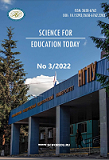Модель конструкта отношения педагогов различных поколений к неопределенности
The model of teachers’ attitude to uncertainty construct: With the main focus on different generations of educators
Author(s): Irina Vitalievna Kazakevich, Tatiana Viktorovna Sinko, Vlada Igorevna PishchikSubject(s): School education, Educational Psychology, Methodology and research technology, Sociology of Education, Pedagogy
Published by: Новосибирский государственный педагогический университет
Keywords: Attitude to uncertainty; Tolerance to uncertainty; Four-factor model; Level of reflexivity; Behavior stereotypes; Generational identification; Types of generations; Personality traits;
Summary/Abstract: Introduction. The article analyzes the concepts of tolerance to uncertainty. The problem of the research is that very few studies have investigated the essence of the construct of uncertainty and its determining factors in teaching practice of educators belonging to different types of generations. The purpose of the research is to build a model of the construct of attitude to uncertainty among teachers of different generations. Materials and Methods. 163 teachers aged between 23 and 67 years (Belaya Kalitva, Rostov-onDon) were interviewed. Data for this study were collected using the following methods and inventories: “Determination of the reflexivity level”; “Tolerance to uncertainty”; “Ten-point personality questionnaire”; methodology of basic stereotypes of normative attitudes in social behavior. Statistical data processing was carried out using the Mann-Whitney difference criterion, exploratory and confirmatory factor analysis. Results. The authors summarized the ideas about the phenomenon of uncertainty in personal, cognitive, situational and affective aspects. The empirical study focusing on comparing the indicators of tolerance to uncertainty was conducted and its relationships with the level of reflexivity, behavior stereotypes and personality traits of teachers – representatives of the "Informational" and "Transitional" generations were identified. Significant differences between representatives of generations in measured indicators were revealed. Both groups demonstrated collectivism in basic behavioral stereotypes. The connection between tolerance to uncertainty and reflexivity was confirmed. Based on empirical data, a four-factor model of teachers' attitude to uncertainty has been constructed, including the level of reflexivity, tolerance to uncertainty, behavior stereotypes, and personality traits. Conclusions. The authors identified the structure and internal connections within a complex psychological object – tolerance to uncertainty. A four-factor model of the construct of the attitude to uncertainty as a difficult-to-formalize object has been constructed and correlated to empirical data.
Journal: Science for Education Today
- Issue Year: 12/2022
- Issue No: 3
- Page Range: 31-47
- Page Count: 17
- Language: Russian

